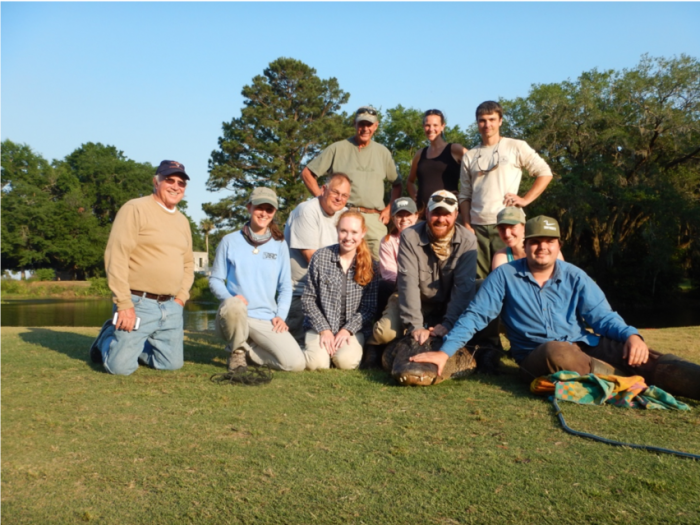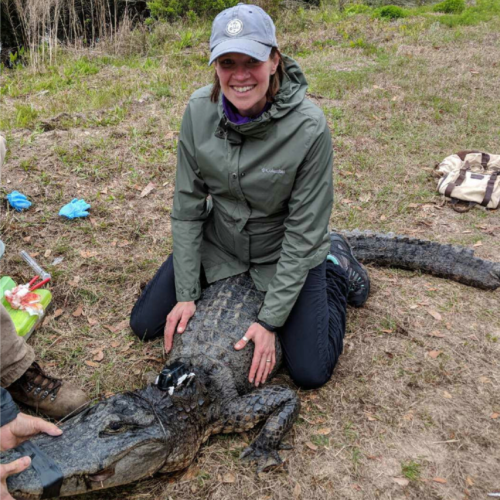IGC Alumni Spotlight: Dr. Cathy Bodinof Jachowski
April 12, 2019

Dr. Cathy Bodinof Jachowski, an Interfaces of Global Change fellow and alumna, accepted a position as an assistant professor at Clemson University in the Forestry and Environmental Conservation Department in August 2016. As you may know, Cathy has spent more than a decade studying hellbenders and she has continued her work on freshwater systems, amphibian and reptile ecology, and conservation physiology at Clemson. She now runs her own lab, the Freshwater Conservation Ecology Lab, and advises two Ph.D. candidates and three M.S. students.

Cathy is currently working on a collaborative, interdisciplinary project to study American alligators in human-dominated landscapes. The work is privately funded through Nemours Wildlife Foundation with the help of CEO Dr. Ernie Wiggers, who helped organize representatives from the residential communities where the research takes place. She works alongside a team of state and local biologists, plus community stakeholders. The challenging, but fun, work is meant to benefit both people and alligators by understanding how landscape alterations affect alligator populations and how landscapes can be managed to minimize human-alligator conflicts.
“I have a tremendous team of collaborators that has helped get our project underway, including crocodilian experts Dr. Thomas Rainwater at Clemson, Tom Murphy, and Andrew Grosse,” said Cathy. “They were critical in the successful capture of 35 adult alligators that were fitted with satellite GPS tags, especially since I was pregnant when the tagging took place, so I was unable to help with the heavy lifting.”
The tags record locations every 3.5 hours and have produced informative data, such as the diversity of movement patterns among individuals. Some gators tend to stay in favorite areas while others are more adventurous and spend time in marine habitats. The team is studying how the gators use different habitats in varying land use conditions, such as how they use rivers and streams in contrast to golf course communities.
“There definitely seems to be an element of ‘personality’ and perhaps learned behavior in the patterns we see,” Cathy said.
As part of the study, an experiment is being done to determine if the routine capture of alligators serves as a form of negative conditioning to instill a healthy fear of humans. The team will conduct visual surveys to determine baseline data on alligator habituation to humans and will be capturing and marking alligators from half the study area to see if they are warier after being handled.
“It is so exciting to see our IGC fellows start their own careers, and quite rewarding to see them put the skills they learned from the IGC program to work. Cathy is a shining example of what we hope to foster in our students,” said Dr. Bill Hopkins, Cathy’s advisor and director of the Global Change Center.
“The IGC program undoubtedly facilitated some of the most valuable learning experiences in my Ph.D. training and fostered an incredible number of strong friendships. For both, I am extremely grateful,” Cathy reflected. “In retrospect I think that some of the greatest benefits of the program came from simply spending time with students, faculty, and professionals outside my own field. Being able to talk to, and work with, individuals that have different perspectives and different values than your own will always be a valuable skill; whether you are teaching, conducting research, writing grants, or communicating science to the public. Two of the three external grants that are funding my current research involve collaborators outside my discipline. Being able to communicate effectively with them to write the grants and execute the project has been critical.”
“My advice to current and future fellows: embrace every opportunity to interact with individuals from other disciplines and practice effective science communication every day.”
Outside of the lab, Cathy enjoys spending time with her husband David – the other Dr. Jachowski at Clemson – their daughter River, and their dog Molly.
“David and I are not only at the same university – we are also in the same department…our offices are just two doors apart! It was quite entertaining to watch the undergraduates figure out how to refer to each of us. I believe they currently use ‘Mrs. Dr. Jachowski’ and ‘Mr. Dr. Jachowski.’”
Cathy’s daughter was born in July 2018, just before Cathy started her third year as a faculty member. “I would be lying if I said that trying to balance my career while managing such a major life change wasn’t daunting…but we are figuring it out day by day. I named her River because, like the rivers I work in, every new day with her is an adventure, she is beautiful, and she is strong. I am counting down the days until she can snorkel for hellbenders with me.”
In addition to her lab work, Cathy is passionate about science communication and the integration of science, society, and policy to promote sustainable change. Before joining the Hokie Nation, Cathy was the environmental education program coordinator at the University of Georgia. She continued to practice her science communication skills by participating in workshops and organizing community outreach events.
“I practice science communication constantly, whether it’s explaining my research to upper administrators, the press, potential and actual collaborators from outside my discipline, or the general public,” Cathy said. “While I still place a high value on outreach, I have been focusing more of my time on research and teaching since arriving at Clemson.”
Clemson is home to the Creative Inquiry Program (CIP), a program to encourage undergraduate involvement in research. Cathy is currently using CIP to involve five undergraduates in the alligator research while enlisting their help to develop a website to educate South Carolinians on alligator natural history and how to safely live in close proximity to them. Cathy hopes to have that website online this fall.
“Living during a period when the spread of misinformation is rampant, science continues to provide an objective way to collect and analyze information that can be used by anyone interested in considering it. While I have no control over what individuals might choose to do with the information that my research provides, I thoroughly enjoy the process of helping to answer important questions, creating new knowledge and facilitating transfer of that information to individuals charged with decision making,” Cathy explained.
“In this way, I view myself as playing a small, but important, role in a much bigger process; and I find that very rewarding. With this in mind, I think it is important to go beyond simply publishing my research in academic journals. I find that some of the most effective knowledge transfer occurs through less formal outlets, including final reports written to state and federal agencies, conversations with professionals, and presentations at professional meetings.”
Cathy earned her Ph.D. from Virginia Tech in August 2016. Prior to coming to Virginia Tech, she received her B.S. in environmental science from Georgetown College in Kentucky and her M.S. in fisheries and wildlife science from the University of Missouri.
While at Virginia Tech, Cathy was a fellow in the Interfaces of Global Change Interdisciplinary Graduate Education Program. She worked in the Wildlife Ecotoxicology and Physiological Ecology Lab with Dr. Bill Hopkins, and her research focused on fully aquatic salamanders called hellbenders and how and why their populations have declined across most of its range. Cathy studied how land use could affect hellbender population density, physiology, and parasitism, which could help explain the decline in numbers.
– Written by Fralin Life Science Institute Communications Intern, Rasha Aridi
Dr. Bodinof in the News!
- Check out May 2018 coverage by SC news station WJCL about a project to investigate alligator movement and behavior in residential communities along the South Carolina coast by Dr. Bodinof and collaborators/
- The Virginia Department of Game and Inland Fisheries (VDGIF) tagged along with Cathy Jachowski and Bill Hopkins back in 2015 to learn more about their research with the Hellbender salamander. The VDGIF video below features some rare footage of hellbender egg collection and underwater use of artificial nest boxes!




